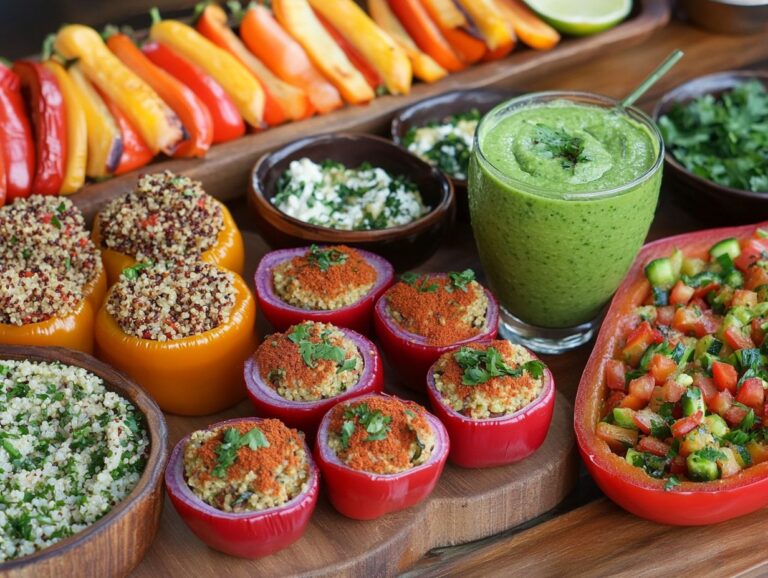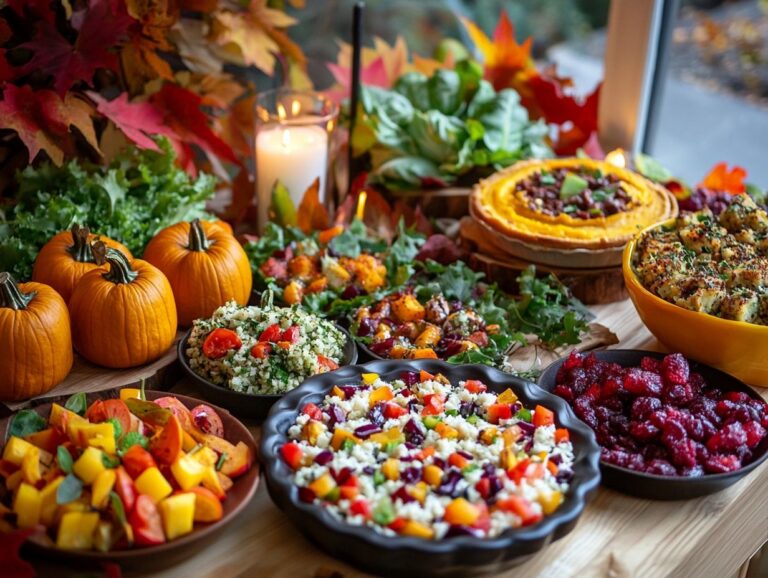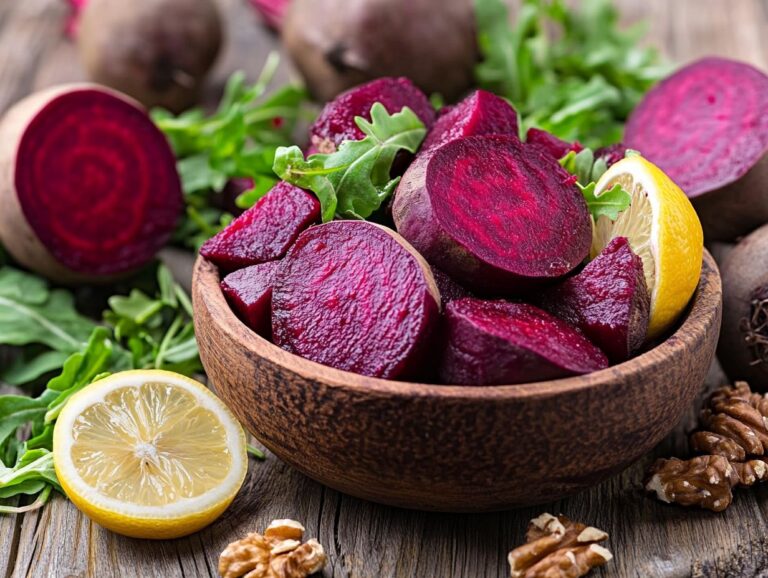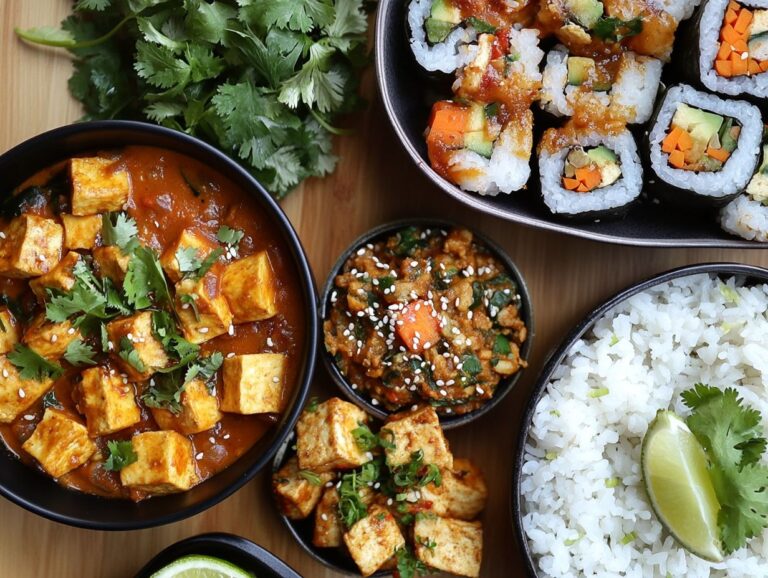As Rosh Hashanah approaches, many individuals are seeking ways to honor tradition while embracing a plant-based lifestyle. This article delves into the significance of Rosh Hashanah and its traditional foods, presenting delicious vegan alternatives that will add vibrant flavors to your holiday table. From appetizers and main courses to side dishes and sweet desserts, you will find creative recipes that celebrate the New Year in a compassionate manner. Join us in making this Rosh Hashanah both meaningful and delicious!
What is Rosh Hashanah and Why Go Vegan?
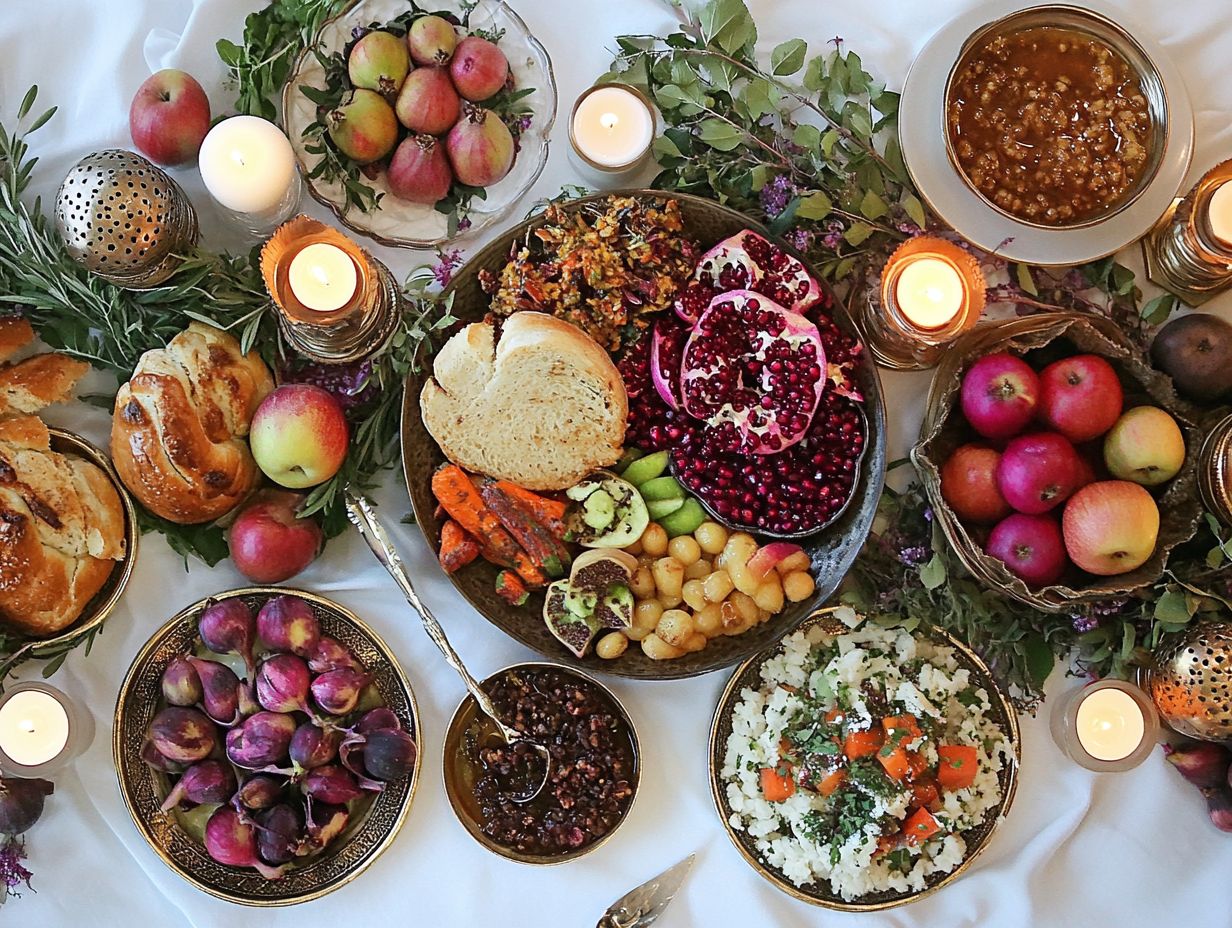
Rosh Hashanah, the Jewish New Year, is a time for reflection, celebration, and spiritual renewal as individuals and communities gather to honor traditions and embrace new beginnings. Celebrating with traditional dishes and vegan recipes highlights the cultural significance of this holiday. This festive holiday is rich in symbolism and cultural heritage, often centered around meaningful rituals that represent the sweetness of life.
One such tradition involves dipping apples in honey and enjoying pomegranate dishes, both of which symbolize the hope for blessings and abundance in the year to come. These symbolic foods are integral to Jewish cuisine during Rosh Hashanah.
Incorporating veganism during this time promotes health and sustainability while aligning with the ethical values of compassion and inclusivity, making it a nourishing choice for everyone involved in the celebration.
As families come together to share the holiday feast, they do so with dishes that not only provide physical nourishment but also carry deep spiritual significance. The consumption of seasonal fruits and grains, like dates, nuts, and fresh herbs, serves as an expression of gratitude and abundance, encouraging mindful eating practices that align with both a vegan lifestyle and the New Year traditions.
Adopting this approach during Rosh Hashanah enables celebrants to honor their heritage while being conscious of their ecological footprint and fostering a sense of responsibility toward the planet. This blending of tradition with modern values, such as incorporating honey alternatives and vegan challah into the Seder plate, exemplifies the transformative potential of the holiday, setting the stage for individual growth and communal harmony in the hope of a prosperous and ethical new year.
Traditional Rosh Hashanah Foods
Traditional Rosh Hashanah foods hold great significance as they embody the themes of the holiday, including sweetness, abundance, and the hope for a prosperous year ahead. Seasonal ingredients like carrots and sweet potatoes are often featured in these festive meals.
Families come together to share these meaningful dishes, such as apples dipped in honey, which symbolize a sweet New Year, and pomegranates, representing the desire for abundance and good deeds.
Other popular foods include freshly baked challah and tzimmes, a sweet carrot dish that reflects the unity of family and community during this important time of year.
Vegan Alternatives and Recipes
Vegan substitutes for Rosh Hashanah dishes are essential for those celebrating the New Year in the Jewish calendar, allowing them to enjoy delicious meals that align with the values of the holiday while promoting health and compassion. Plant-based alternatives, such as vegan brisket and vegan kugel, add exciting flavors to the holiday table. Fortunately, there are many simple ways to create vegan alternatives for traditional Rosh Hashanah foods. By utilizing plant-based ingredients, one can craft delicious recipes that honor the customs of the New Year while accommodating dietary restrictions and preferences.
For example, many Rosh Hashanah recipes can be easily adapted to be free of animal products without sacrificing flavor. Incorporating seasonings like cinnamon can enhance traditional dishes with a gourmet twist. One can make a healthier version of vegan challah bread by using whole grain flour and natural sweeteners. Another option is to prepare Tzimmes with roasted carrots, sweet potatoes, and sweet agave syrup for a unique twist that honors the flavors of Jewish holidays. Additionally, an apple cake topped with coconut cream instead of whipped cream serves as a delightful dessert.
While maple syrup is traditionally served alongside apples and honey, it can also be used as a substitute in Rosh Hashanah recipes, maintaining the traditional symbols of sweetness. With its strong flavor, maple syrup is often preferred by vegans and can provide a taste that some may find superior to honey. When replacing honey with maple syrup or agave syrup, use it in the same quantity, as it offers a similar texture.
To enhance the culinary experience, consider using organic and locally sourced produce, which can boost the nutritional value of the meal while lowering its carbon footprint. Incorporating spices can elevate the flavors of dishes, and experimenting with various whole grains can further increase their nutritional benefits.
In summary, here are some tips for using vegan substitutes in Rosh Hashanah recipes, which are perfect for family gatherings and festive cooking:
- Use whole grain flour and natural sweeteners for challah.
- Substitute honey with maple syrup or agave syrup in recipes.
- Opt for organic and locally sourced ingredients.
- Experiment with spices to enhance flavor.
- Incorporate whole grains for added nutrition.
Starters and Appetizers
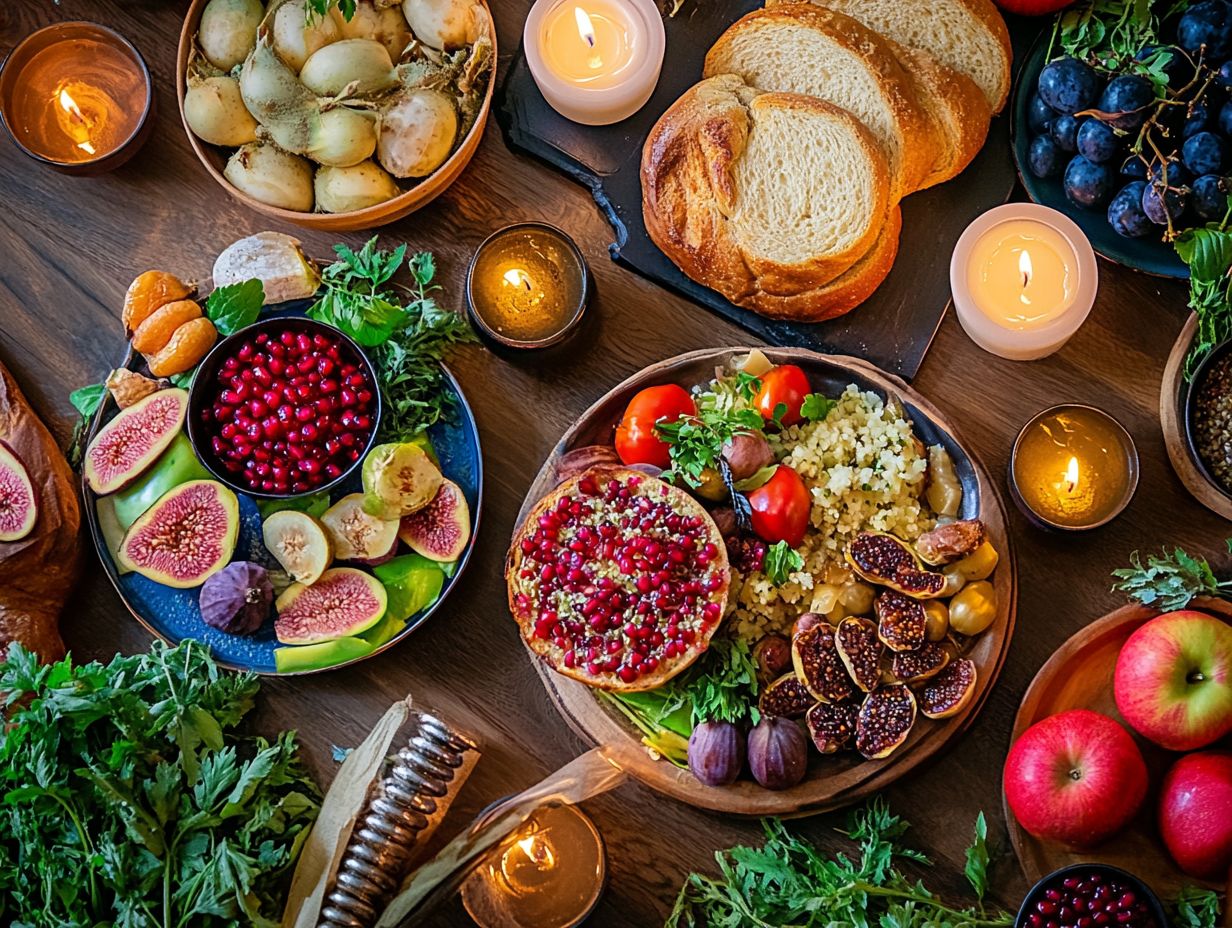
Starters and appetizers are essential components of a festive Rosh Hashanah meal, offering guests an early taste of the celebration and inviting them to enjoy plant-based options that honor the holiday’s traditions. These culinary delights serve as a way for families and loved ones to come together and share in the joy of the occasion.
Traditionally consumed before the main course, these foods often include salads, appetizers, and soups, all designed to stimulate the appetite and foster a sense of togetherness during the New Year celebration. Vegan appetizers, such as quinoa salad and beet salad, are delightful additions to the menu.
Among the popular starters is the Traditional Israeli salad, which consists of tomatoes, onions, cucumbers, garlic, and parsley, typically garnished with olive oil and lemon juice. This dish is complemented by a vibrant fruit platter featuring seasonal flavors. Chopped salad, similar to Israeli salad, features a mix of fresh, seasonal vegetables. Another visually stunning option is rainbow salad, crafted from an array of colorful vegetables such as bell peppers, carrots, and cabbage, providing a vibrant way to incorporate various nutrients into the meal.
Carrot salad is particularly significant during this time, as carrots symbolize blessings for a sweet year ahead. Variations of this dish can include toppings such as raisins, dill, olive oil, or orange juice. Potato salad is a simple yet satisfying dish that can be prepared in advance, making it a convenient addition to any Rosh Hashanah feast. It can be dressed with vinegar, yogurt, or mayonnaise, depending on personal preference.
Egg salad offers a protein-rich option and can be seasoned in various ways. It is often enjoyed with matzo or pita, making for a filling meal. Chickpea salad is another hearty choice, packed with protein and fiber, and can be customized with a variety of vegetables and dressings. Cheese platters also feature prominently in holiday meals, and vegan options can include various dairy-free cheeses accompanied by fruits and nuts for a delightful treat.
Soups provide warmth and comfort, whether enjoyed on their own or with bread. They can often be prepared ahead of time and easily reheated, making them a practical choice for holiday gatherings. Classic chicken soup, typically made with fresh vegetables and herbs, is frequently served as a main course, often accompanied by matzo balls or noodles. Vegetable soup allows for the inclusion of seasonal vegetables and can be tailored with different broths and seasonings to suit individual tastes.
Creamy soups, made from pureed vegetables or legumes, are also popular during the holiday, with options for dairy-free milks or creams. Lentil soup, rich in protein and fiber, is another great plant-based option, and can be flavored with a range of vegetables and spices. Tomato soup, a classic dish for Rosh Hashanah, can be prepared using fresh or canned tomatoes and garnished as desired.
These starters and appetizers play a vital role in the Rosh Hashanah menu, symbolizing the joy of the New Year celebration and helping to unite families and communities. They not only build excitement for the main meal but also create opportunities for family and friends to connect and share in the festive spirit of the holiday.
Plant-based Options for the Holiday Table
Plant-based options for the holiday table not only provide delicious alternatives but also celebrate the diversity and richness of Rosh Hashanah’s culinary traditions.
Dishes like vibrant roasted vegetables and creative salads showcasing seasonal produce offer a delightful array of flavors and textures that appeal to everyone at the table.
Choosing vegan options contributes to a more inclusive dining experience, allowing all guests to partake in the festivities and enjoyment of the meal.
Innovative recipes, such as a sweet and tangy apple and pomegranate salad with crunchy nuts and a drizzle of tahini, can add a refreshing twist to the spread.
Hearty lentil stews spiced with warming autumn herbs not only nourish but also symbolize the abundance of the season. These comforting dishes capture the essence of homemade comfort food.
These plant-forward dishes reflect community values by inviting shared experiences and conversations around food that is not only nourishing but also visually appealing.
As families and friends gather, these thoughtfully prepared meals enhance the atmosphere of togetherness, celebrating the joy of the New Year with compassion and creativity.
Main Courses
Main courses play a vital role in Rosh Hashanah celebrations, offering a chance to highlight hearty vegan alternatives to traditional dishes that symbolize abundance and togetherness. Vegan dishes, such as vegan gefilte fish and vegan matzo ball soup, bring ethnic flavors and culinary creativity to the table.
Featuring plant-based recipes that are both satisfying and flavorful, these meals accommodate diverse dietary preferences while honoring cherished customs.
From savory stuffed vegetables to rich lentil roasts, these dishes not only nourish the body but also elevate the spirit of gathering with family and friends during this significant holiday.
Vegan Versions of Traditional Dishes
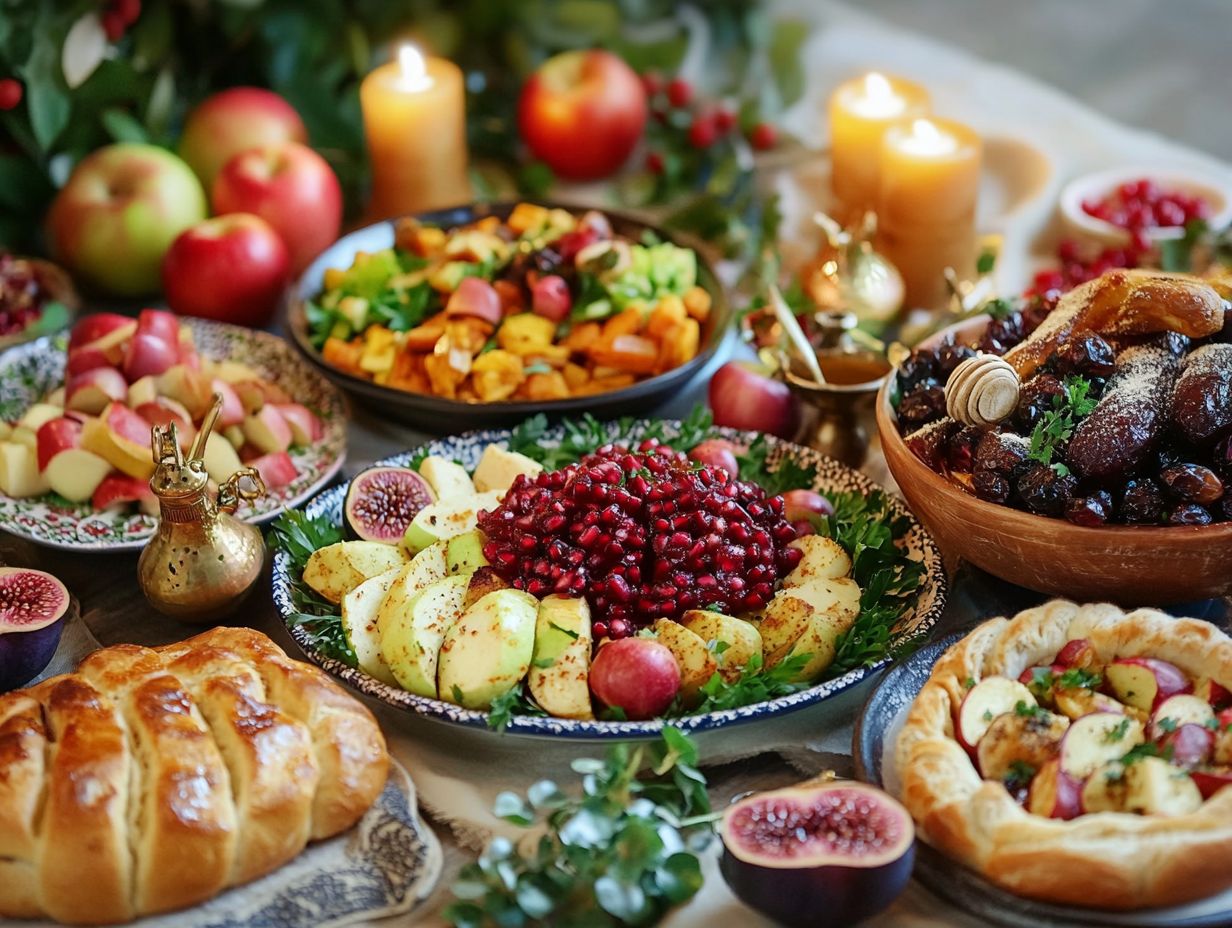
Veganizing traditional Rosh Hashanah dishes results in unique meals that honor the holiday’s traditions while promoting health and sustainability. By creatively substituting ingredients, beloved recipes such as tzimmes, vegan kugel, and vegan gefilte fish can be enjoyed by everyone at the holiday table without compromising on taste or ethical values. These modifications preserve the spirit of the holiday while providing a modern twist that aligns with contemporary culinary practices.
For tzimmes, butternut squash and carrots can replace sweet potatoes and prunes, while pure maple syrup and orange juice can substitute for honey, creating a version of the dish that is both sweet and respectful of the custom of eating symbolic foods like sweet dishes during the holiday.
In the case of vegan kugel, eggs can be replaced with a mixture of chia or flaxseeds and water, which effectively binds the dish together and adds dietary fiber and omega-3 fatty acids. This vegan alternative upholds the essence of holiday meals while introducing exciting flavors.
Creating versions of these dishes with whole foods such as quinoa or brown rice can enhance nutrition and produce hearty meals that everyone will enjoy. Additionally, incorporating spices such as cinnamon, nutmeg, and ethnic flavors can help mask any differences in taste or texture from the substitutes and celebrate the culinary heritage of Jewish cuisine.
These spices are traditional to holiday fare, making it an ideal opportunity to offer meals that are both healthier and rich in flavor to honor this important celebration. Including fresh herbs and olive oil can elevate these plant-based creations, enhancing their flavor profiles and nutritional value.
Sides and Accompaniments
Sides and accompaniments play a crucial role in enhancing the overall appeal of Rosh Hashanah meals, providing a harmonious blend of flavors that complement the main courses. From vegan brisket to challah and a colorful beet salad, these dishes incorporate seasonal ingredients that align with the New Year traditions.
These vegan dishes not only add variety to the holiday table but also allow for creativity in preparing seasonal ingredients that embody the spirit of the New Year.
From roasted root vegetables to lentil salads infused with citrus, these accompaniments offer both nourishment and enjoyment, bringing family and friends together in celebration.
Creative and Delicious Side Dishes
Creative and delicious side dishes bring a vibrant touch to Rosh Hashanah meals, showcasing the versatility of vegan cuisine while celebrating seasonal produce. By incorporating fresh herbs, spices, and colorful ingredients, these sides not only enhance the visual appeal of the holiday table but also offer a delightful range of flavors.
Whether it’s a zesty quinoa salad or a savory vegetable medley, these dishes provide nourishment and satisfaction, ensuring that every guest feels included in the culinary celebration.
To create a truly memorable Rosh Hashanah experience, consider preparing dishes that highlight the earthy sweetness of fall vegetables, such as roasted beets and sweet potatoes.
A tangy apple and walnut coleslaw can evoke traditional holiday themes, while a hearty lentil stew infused with fragrant spices serves as a comforting centerpiece.
For presentation, arrange the sides in colorful bowls, garnish with fresh herbs, and incorporate seasonal elements like pomegranate seeds for a pop of color, enhancing the festive atmosphere that honors the spirit of renewal associated with the New Year.
Desserts
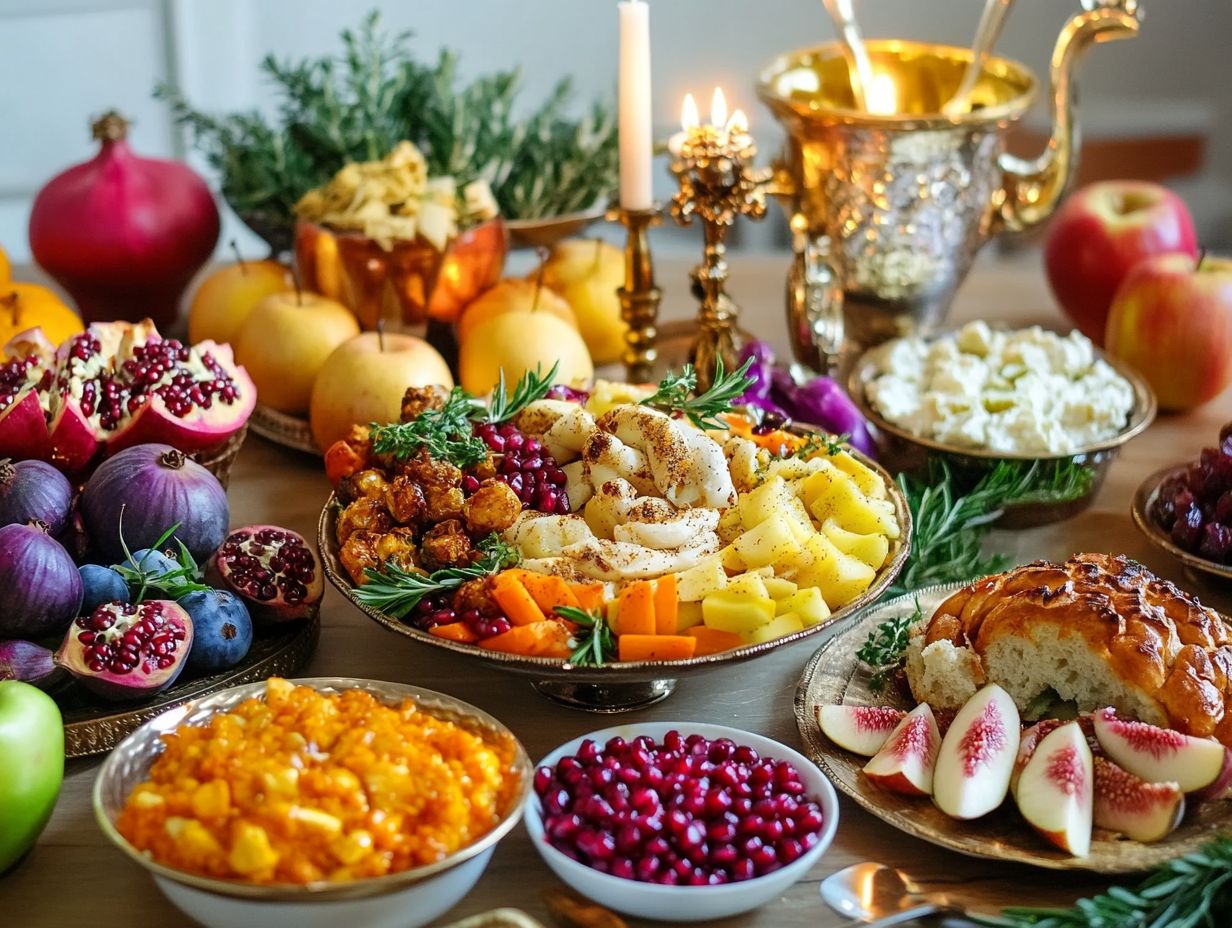
The celebration of Rosh Hashanah is not complete without delightful desserts that capture the essence of sweetness, renewal, and hope central to the holiday. Vegan desserts can be just as indulgent as traditional options, allowing participants to enjoy ethical eating practices without sacrificing the festive spirit. Rosh Hashanah dessert recipes, such as vegan chocolate cake, a fruit platter featuring seasonal apples and pomegranates, and gluten-free treats, not only enhance the meal’s sweetness but also embody the themes of hope and joy as the new year begins.
Vegan Chocolate Cake with Maple Syrup
Ingredients:
- 1 ¾ cups (220g) all-purpose flour
- 1 cup (200g) coconut sugar
- 1/3 cup (35g) unsweetened cocoa powder
- 1 tsp baking powder
- 1 tsp baking soda
- 1/2 tsp salt
- 1 cup (250ml) unsweetened almond milk
- 1/2 cup (120ml) maple syrup
- 1/3 cup (80ml) vegetable oil
- 2 tbsp (30ml) apple cider vinegar
- 1 tsp vanilla extract
Instructions:
- Preheat the oven to 350°F (180°C) and grease and line an 8-inch (20cm) round cake pan.
- In a large mixing bowl, whisk together the flour, coconut sugar, cocoa powder, baking powder, baking soda, and salt.
- In another bowl, mix the almond milk, maple syrup, oil, vinegar, and vanilla extract.
- Pour the wet ingredients into the dry ingredients and gently mix until just combined.
- Pour the batter into the prepared cake pan and bake for 30-35 minutes or until a toothpick comes out clean.
- Allow the cake to cool in the pan for 10 minutes, then transfer it to a wire rack to cool completely.
- Serve with vegan vanilla ice cream.
Vegan Vanilla Ice Cream with Almond Milk
Ingredients:
- 2 cups (500ml) almond milk
- 1 cup (250ml) coconut cream
- 1/2 cup (100g) maple syrup
- 1 tbsp vanilla extract
- Pinch of salt
Instructions:
- In a blender, combine the almond milk, coconut cream, maple syrup, vanilla extract, and salt. Blend until smooth.
- Pour the mixture into an ice cream maker and churn according to the manufacturer’s instructions.
- If you don’t have an ice cream maker, pour the mixture into a shallow dish and freeze for 1-2 hours, stirring every 30 minutes until it reaches the desired consistency.
- Serve in bowls and enjoy!
Sweet Treats for a Sweet New Year
Sweet treats play an essential role in Rosh Hashanah celebrations, symbolizing the hope for a year filled with joy and prosperity. Vegan desserts provide creative alternatives that honor this tradition while accommodating diverse dietary needs. By using honey alternatives like agave and maple syrup, these desserts maintain the festive spirit associated with holiday meals.
From using honey alternatives like agave in baked goods to crafting decadent fruit-based desserts, these sweets are designed to bring pleasure and satisfaction to all guests, making the New Year a truly memorable occasion.
Alongside agave, bakers can explore the rich flavors of maple syrup or date syrup to add sweetness and depth to their creations. For instance, an apple and cinnamon cake can showcase the natural sugars from apples, complemented by warm spices to create a comforting dessert that echoes traditional dishes. These plant-based alternatives contribute to the nurturing qualities of such celebratory recipes.
Another delightful option is a pomegranate mousse made with coconut cream, which beautifully reflects the symbolism of the holiday. This vegan creation, alongside a variety of other desserts, adds to the communal experience of Rosh Hashanah, embracing both innovation and culinary creativity.
By incorporating seasonal fruits and nuts, these vegan creations not only celebrate the New Year but also offer everyone a delicious way to partake in the festivities without compromising their values. With the inclusion of refreshing drinks, family gatherings become an even more joyous occasion, filled with gratitude and blessings.
